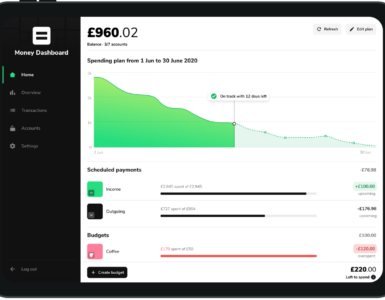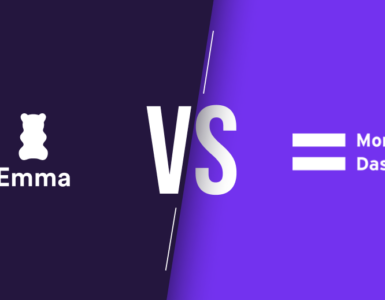Struggling to stick to your budget? You might find that you’ve missed out on some key budgeting categories.
In the article below we’re going to list all the main budgeting categories that’ll help you master your money.
First up we have Emma’s most used budgeting category; bills.
1) Bills:
Paying your bills on time is extremely important. Miss a payment, and you could see your credit score impacted.
Budgeting for bills therefore reduces stress, gives you greater control over your finances, and can save you money in the long run.
The type of bills you need to budget for will vary depending on your circumstances, so take the time to review your past spending history to ensure you’ve accounted for everything. Don’t forget to include any annual payments that you might have.
Things to include in your bills category: rent, mortgage, minimum credit card repayments, loans, car finance, overdraft, gas and electric, water, broadband, council tax.
2) Shopping:
Shopping is the second most popular budgeting category in Emma. What items you include in your shopping budget will vary massively depending on your spending habits.
A lot of people struggle to stick to their shopping budget. That’s because spending may vary month to month, and you’re more likely to impulse buy items that fall within this category.
Try looking at your past three months spending for any shopping items. Use the average for these months to set your shopping budget, or review your transactions to see where you’ve spent the most.
If you’re shocked at how much you’re spending in this category, then research little ways to cut costs – like using cashback or discount codes. If you’re prone to impulse buying, then add a cooling-off rule that means you have to wait 24 hours until you can buy anything.
Things to include in your shopping category: clothes, tech, personal care, beauty treatments, haircuts.

3) Housing:
The housing category is Emma’s third most popular budgeting category.
Again, what sits under your housing budget will vary. Some people like to include their rent, or mortgage payments under the housing category, instead of under the bills category, but this is totally down to personal preference.
You could also budget for home improvements, cleaning materials, new decor, home insurance… the list goes on. The trick is to think about what monthly costs are involved in owning your home, and allocate a realistic amount.
Things to include in your housing category: rent, mortgage repayments, insurance, home improvements, home decor.
4) Groceries:
For the majority of people, grocery shopping is part of our everyday lives. When it comes to setting a groceries budget it can therefore be helpful to first think about your shopping habits.
If you do a big shop once a week, work out how much you can spend a month and divide this number by 4. Likewise, if you pop to the shops every day (a common occurrence if you’re in London) then having a daily grocery allowance can help you stick to your budget.
Need to reduce how much you’re spending on groceries? Meal planning, making good use of leftovers, and keeping a fridge list can help keep costs low.
Things to include in your grocery budget: supermarket shopping, quick snack trips, food you need for your lunches at work.

5) Your Financial Future:
According to the 50/30/20 rule, 20% of your after-tax income should be spent on your financial future.
How you decide to allocate that money is dependent on your financial goals, but including it as a budgeting category ensures that you’re prioritizing this area. Unlike the other types of budgeting categories, this is one category you’re aiming to exceed every month!
Don’t be put off by the 50/30/20 rule if you can’t currently save that much. Work out your own capabilities and decide if you want to add this cash into a savings account every month, invest it, or maybe use the money to make extra debt repayments.
Things to include in your financial future category: savings, investments, extra debt repayments, retirement fund, extra payments on your mortgage, extra student loan payments, annual bills, emergency fund.
6) Subscriptions:
If you’ve already budgeted for your bills, then subscriptions like your gym membership and Netflix payments may already be accounted for.
We like the idea of having a separate category for your subscriptions. This splits out your monthly payments from the “must-haves” to the “nice-to-haves”.
If you ever needed to cut back on your spending, you’d then easily be able to tell which bills could be cancelled, and which you needed to continue paying.
Things to include in your subscriptions category: gym membership, streaming services, software, food delivery boxes.
7) Transport:
Getting your transport budget right is crucial. After all, mess up the numbers and you’ll either end up overspending, or you’ll have to walk everywhere…
If you’re not in the position to walk everywhere (think work, to the supermarket, to see your friends) then chances are your transportation costs are going to eat up a significant portion of your income.
Shocked at how much you’re spending each month on travel? Research if there are any other ways to get around, or look into cheaper alternatives.
Things to include in your transport category: fuel, travel card, parking, road tax, repairs, insurance, public transport.

8) Eating Out:
A lot of people remember to include groceries in their budget, but often forget about the cost of eating out.
If you eat out regularly, then it might be a good idea to include this as a separate category in your budget.
Splitting these categories in your budget will help identify how much you’re spending on the essentials. If you then need to reduce your spending, you’ll easily be able to spot areas that you can cut back.
Things to include in your eating out category: restaurants, takeaways, coffee, alcohol.
9) Entertainment:
A night out at a bar, or going to the cinema with your friends should also be considered in your budget.
If you know you’re going to be spending money on either of these things, then don’t miss it out. Doing so will mean you either end up overspending, or you’ll miss out on all the fun.
You don’t need to allocate a huge amount of money to this category if you can’t afford to. There are plenty of cheap alternatives for nights out, but having an entertainment category will mean you can confidently spend money on things that make you happy.
Things to include in your entertainment category: cinema trips, nights out, concerts, dinner parties, events.
10) Pets:
If you’re responsible for any pet, then including a pet category in your budget is a must.
While you may be able to purchase a pet for a small fee, the cost of raising a healthy and happy animal can soon add up.
If you’re thinking of bringing home a new furry friend you have to consider the cost of basic items like a bed, cage or carrier, toys, a collar, a lead. Once you get your chosen animal you then have to think about vaccinations, their food, any vet fees, as well as what will happen if you choose to go away on holiday.
Things to include in your pet category: food, insurance, vet bills, animal sitters, entertainment, toys and accessories.

11) Gifts:
While you may be able to handle the cost of an occasional birthday present, budgeting for bigger occasions like Christmas or a friend’s wedding can make a huge difference to the success of your budget.
Things to include in your gifts category: Christmas, birthdays, anniversaries, weddings.
Summary:
There are lots of different things that you might want to consider when you’re setting up your monthly budget. Work your way through this list of budgeting categories and review your past spending history to make sure you’re setting an accurate amount.
Want more tips on setting up your budget, check out 4 budgeting methods that actually work, and How to budget using the Emma app.
Are there any budgeting categories we’ve missed? Let us know by starting a convo on the Emma Community, or drop us a message on Twitter, Instagram, and Facebook.







Add comment